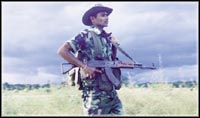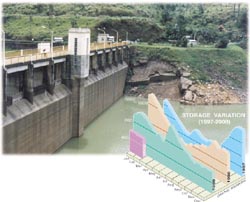
12th March 2000
Front Page|
News/Comment|
Editorial/Opinion| Business|
Sports|
Sports Plus| Mirror Magazine

![]()

- Rain dispels gloomShort Respite only, says CEB
- Breaking waves in little yacht
- Booming memories
- They only know war
- Journey to Antarctica
- From prankster to prim and proper civil servant
- Their life
- So free in Serendib
- They thrashed out violence
- Language and linguistics: What it's all about - Book review
- A little boy's courageous tale and how women dressed up - Bookshelf
- Her achievements, her grievances
- Kala Corner - by Dee Cee
- Sri Lanka's Cinderella
- Lots of water to fight Urinary infection
- Devolution of power to the provinces
- Kumar-the man and his politics
- Haj: a journey towards world Muslim unity
- Letters to the editor








Rain dispels gloomShort Respite only, says CEB
By Tharuka Dissanaike
 Not
many realised how close the country came to blackouts and power cuts a
month ago. But fortunately the weather gods decided to be benevolent. February
and March, generally regarded as the driest months of the year produced
rain- a delayed monsoon spell which continues still- pulled the country
back from the brink of a power crisis.
Not
many realised how close the country came to blackouts and power cuts a
month ago. But fortunately the weather gods decided to be benevolent. February
and March, generally regarded as the driest months of the year produced
rain- a delayed monsoon spell which continues still- pulled the country
back from the brink of a power crisis.
This amply demonstrates how much the country depends on the weather for electricity generation- especially on the North-East monsoon, which is more likely to fail. Although to the layman it may seem there was no shortage of rain last year, CEB officials say the crucial catchments of the Mahaweli received little rain and hence at the beginning of this year combined reservoir storage was at an all-time low.
January of other years saw reservoir storage values fluctuating between 800 GWH to 1200 GWH (giga watt hours). For instance, 1998 was a good year when storage was slightly over 1200 GWH. But this year began way down the chart- at less than 600 GWH. Panicset in and CEB officials began to plan for possible power interruptions and emergency generation, first with hints in the newspapers about possible power cuts and then arranging small diesel generation units to feed the grid.
A small 20 MW plant by a company called Aggreko (which came forward with emergency generation earlier) was commissioned in January. During that time all the power plants in the country, hydro and thermal were running pell-mell and engineers dreaded the possibility of a breakdown in any plant.
Then the weather turned freakish. Rains began again. When in other years the storage capacity would steadily decline from the January figure, until the rains in April supplemented the drying reservoirs, this year the downward curve was arrested quickly and buoyed upwards in a pattern alien to the last ten years. A good thing too.
"We are out of the woods for the time being," said D. C. Wijeratne, CEB's Additional General Manager.
Today, the country's energy requirement is met with more thermal (diesel-run) power than hydro. Of the 18.8 GWH of consumed power on Monday last, 9.9 GWH were generated through thermals and the rest on hydro. The trend is changing.With the dwindling of sites to construct large dams and reservoirs and the delay of the CEB's much vaunted coal power plant, the country appears to have little choice in the short term but to depend on diesel-run power plants.
For the first time in many years, the CEB is facing a year of financial loss. The cost of diesel has increased and thermal generation costs are directly linked to the price of fuel. Due to increased thermal generation, the CEB has found itself scraping the bottom of its coffers to keep paying for diesel electricity units.
The short-term future plan of the CEB has only room for diesel and gas-turbines. Next July, a 60 MW barge mounted power plant would be commissioned out of the Colombo harbour. Another 40 MW of power will come from two small plants to be commissioned in Anuradhapura and Matara by the end of 2000. All these, according to the government's policy of opening the sector for private investment, are on BOO ( Build, Own and Operate) basis where CEB pays for each unit of power bought.
"The price component consists of fixed costs and variables like fuel. Every time oil prices increase the cost comes down directly to the CEB," Mr. Wijeratne said.
But how long will the CEB be able to cushion the price increases? Soon the impact of costs will be passed down to the consumer. An electricity tariff increase is likely to be effected sometime this year.
"This is the danger in depending on oil in the long term," Mr. Wijeratne said. "Oil prices are set to increase with demand. Within the last ten months the price of oil increased three fold- a country like ours cannot bear such shocks to a vital sector like energy."
But the CEB's panacea to all these problems is the disputed coal power plant. CEB's generation planning report 1999-2013 envisages the first coal power plant in 2004. That is already an impossibility. Work is virtually at a standstill, pending a decision from the highest political quarter- the President, who has reportedly assured the Catholic church led opposition to the coal power plant that it would not go ahead without the sanction of the people.
The setting up of the coal power plant has hung in the balance for almost two decades while politicians and those opposing its establishment have forced it to move from site to site, settling finally on Noraichcholai, which is close to the hallowed Catholic shrine of St. Anne's, Talawila. But during all this the CEB or the government had no interest in finding an alternative. The CEB still insists there is no option- coal is the cheapest, most widely available and economical fuel for Sri Lanka in the long term. Upto 2013, the CEB hopes to commission four 300 MW coal plants to meet the country's energy needs. But with donor money waiting and environmental clearances under its belt, the CEB is yet unable to start work on the first plant.
Meanwhile, the government has announced sweeping power sector reforms that will end the CEB's monopoly over the energy sector. The large, bureaucratic CEB will be fragmented into units that will evolve into companies, managing power generation, transmission and distribution separately. Generation will further be fragmented into units- dealing with a group of reservoirs or the Kelanitissa complex.
Distribution will also be decentralised to create a competitive and more efficient environment. A powerful independent regulator will be appointed to ensure that public interest is safeguarded.
![]()
Front Page| News/Comment| Editorial/Opinion| Plus| Business| Sports| Sports Plus| Mirror Magazine
Please send your comments and suggestions on this web site to

